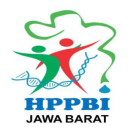Development of Digital-Based Interactive Modules in Senior High School
DOI:
https://doi.org/10.25134/quagga.v15i2.5Keywords:
Interactive Module, Digital BasedAbstract
This study aims to produce a valid and practical interactive module. The research uses the Research & Development (R&D) type of development using the ADDIE model which includes five stages, namely the Analysis, Design, Development, Implementation and Evaluation stages. The sample in this study consisted of two types of samples, the first trial I (limited trial) in class X MIPA 3 and trial II (overall trial) in class X MIPA 4 and X MIPA 5. validation test and practicality test. The results of this study are: 1) The interactive module developed in this study is valid, it can be seen from the validation results in the material and media test. The data from the validation test results showed that the results of material validation obtained an overall average validity of 82.8%. While the validation results on the media test obtained an overall average validity of 88.5% so based on this value, the digital-based interactive module product is in the very valid category because it is in the 81-100% interval. 2) This study uses student response sheets to measure the practicality of the interactive module, as many as 94 students of class X MIPA with a level of practicality that is practical. This means that the interactive modules developed are practically used by students. Based on the results of this study, it can be concluded that the digital-based interactive module on ecosystem materials to improve scientific attitudes and students' cognitive learning outcomes developed is valid and practical to use in learning.
References
Airlanda, G. S. (2016). The development of HSPS-based biology learning modules is combined with blended learning to improve the science process skills of Xi Science students of Petra Christian High School Malang. Journal of Science Education, University of Muhammadiyah Semarang. 4(1).
Alfiriani, A, &; Hutabri, E. (2017). Practicality and Effectiveness of Computer-Based Bilingual Learning Modules. Journal of Education. 1(1).
Arifin, Z. (2017). Developing instruments measuring students' critical thinking skills in 21st century mathematics learning. Journal of THEOREMS(The Original of Mathematics). 1(2), 92-100.
Arimadona, S. (2016). Development of Biology Learning Modules Based on Islamic Science Integration. Rokania Journal of Education. 1(2), 70.
Awwalina, N. M., &; Indana, S. (2022). Development of QR Code Based Interactive E-module to Train Class X High School Student'sScience Literacy Skills in Ecosystem Topics. Bioedu. 11(3), 712-721.
Branch, R. M. (2009). Instructional Design: The ADDIE Approach. Department of Educational Psychology and Instructional Technology University of Georgia 604 Aderhold Hall Athens, GA 30602 USA.
Ervina, M.N, &; Nanik, L. (2021). Development of a module based on flip and pop up full games integrated with Islam on the concept of class XI body defense system. JPSP. 1(1), 11-25.
Farida, N, &; Triani, R. (2021). Development of flipbook-assisted interactive e-modules in statistics courses. SNPPM Journal. 7-6.
Fatmawati, A. (2016). Development of Learning Tools for the Concept of Environmental Pollution Using a Problem-Based Learning Model for Senior High School Class X. Edusains.4(2), 94-103.
Hobri. (2010). Development Research Methodology. Jember : Salsabila Pen.
Masnur, M. (2010). How to Write a Thesis?. Jakarta : Bumi Aksara. P-7
Munandar, R.R., Cahyani, R., &; Fadilah, E. (2021). Development of Sigil Software e-modules to improve student learning outcomes during the Covid-19 pandemic. Scientific Journal of Biology Education. 07(04), 191-202.
Muyaroah, S., &; Fajartia, M. (2017). Development of Android-Based Learning Media using Adobe Flash CS 6 Application on Biology Subjects. Innovative Journal of Curriculum and Educational Technology IJCET. 6(2), 79 – 83.
Nugraha, S. A., Sudiatmi, T., &; Suswandari, M. (2020). Study of the Effect of Online Learning on Grade IV Mathematics Learning Outcomes. Journal of Research Innovation. 1(3), 265–276.
Prastutiana, W. (2018). Development of Poe-oriented modules (Predict, Observe, Explain) on mushroom material to improve the scientific attitude of students at SMA Negeri 15 Bandar Lampung. Thesis. Raden Intan State Islamic University Lampung.
Putri, N. R, & Amrizal. (2020). Development of professional PDF FLIP assisted e-modules on Class VII ecosystem material in Miftahussalam MTs. Medan State University. 1(01), 229-239.
Silvi. (2016). Development of learning media in the form of bulletins in the form of pocket books for integrated science learning. Scientific Journal of Physics Education. 5(1), 1-14.
Sugiyono. (2017). Quantitative, Qualitative, and R&D Research Methods. Bandung. Alfabeta, CV.
Syamsu, F. D. (2017). Development of Contextual Based Biology LKS Equipped with a mind map on archaebacteria and eubacteria material for high school students. Journal of Bionatural. 4(1), 26-34.
Wiratama, G. N. K., &; Margunayasa, G. (2021). E-module interactive science content in sub theme 1 theme 5. Pulpit PGSD Undiksha. 9(2), 258-267.
Wulandari, D. D., Adnyana, P. B., &; Santiasa, M. P. A. (2020). Application of interactive e-modules to student motivation and learning outcomes in class X biology learning. Journal of Biology Education Undiksha. 7(2), 66-80.

















